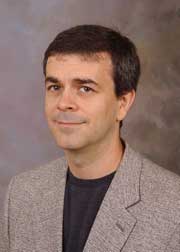2006-2007 Provost Lecture Series

If the World is Flat, Why Am I Trudging Uphill? Musings on How Distance Education, the Internet, and Globalization Impact Teaching in Kansas
Wednesday, April 25, 2007
1:30 to 3:00 p.m.
Hemisphere Room
Hale Library
Roger McHaney
Professor of Management Information Systems and Coffman Chair for University Distinguished Teaching Scholars
Kansas State University
Biographical Sketch
Roger McHaney is a professor of management information systems and a Faculty Fellow in Kansas State University's College of Business Administration. A K-State faculty member since 1995, McHaney teaches courses in enterprise systems, information resources management and systems analysis. His areas of research include discrete event simulation, computer-mediated communication systems, SAP and organizational computing. McHaney has bachelor's and master's degrees from Lake Superior State University and doctorate in computer information systems and quantitative analysis from the Sam M. Walton College of Business at the University of Arkansas. He is the current director of K-State's business and international education grant program and has lectured in a variety of countries including New Zealand, Australia, China, United Kingdom, Italy, Germany, Greece, Belgium and The Netherlands. McHaney has published in numerous journals, written textbooks, and developed a variety of instructional material. He recently accompanied Kansas Governor Kathleen Sebelius on a trade mission to China.
Abstract
Academics are finding words and phrases such as globalization, the world is flat and emerging technologies sprinkled liberally throughout the new literature. Even the stodgiest keepers of the most turgid disciplines have begun grumbling that a revolution of sorts is underway. At the same time, the popular press has convinced the layperson that everything---from buying goods and services in China to exploiting the nearly thawed Northwest Passage across Northern Canada to instant intelligence on the Internet---has become part of daily life. This leaves many excellent teachers and learners averting their eyes ashamed to admit they lack the skills to "Google" their way out of an empty box. But should they feel this way? Should teaching and learning be easy? Anecdotal evidence will be presented to demonstrate that Kansas has been "flat" far longer than the rest of the world and many K-State teachers are no strangers to technology adoption. Others, not on the technology vanguard, will discover teaching infrastructure can be improved with premeditated forays into Thomas Friedman's flat world where distance education techniques can be brought back into the traditional classroom.